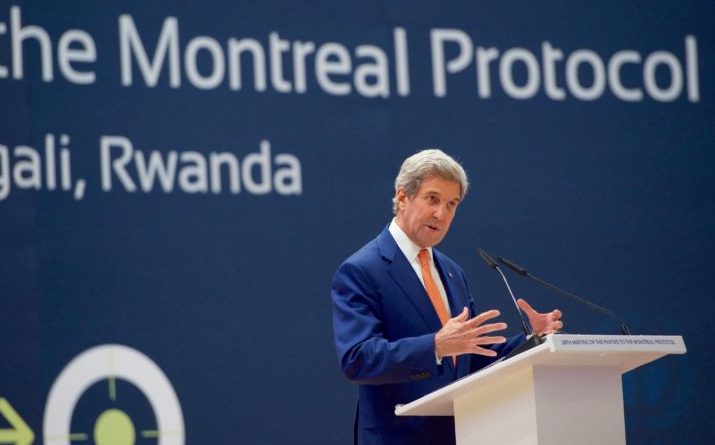International Agreement to Phase Out HFCs Will Significantly Reduce Greenhouse Gas Emissions
The international community just took another big step forward in fighting global climate change. The 170 nations represented at the 28th meeting of the parties to the Montreal Protocol announced their agreement to phase out hydrofluorocarbons (HFCs) (1). This deal was made in Kigali, Rwanda on Saturday, October 15th after five days of negotiations (2). The agreement mandates that developed countries begin to eliminate HFCs by 2019, and that developing countries begin by 2024 (1,4). The Kingali agreement has tremendous potential for success because it has a specific, single target (2).
HFCs are used as coolants in refrigerators and air conditioners. They were developed as an alternative to chlorofluorocarbons and hydrochlorofluorocarbons, after these chemicals were banned by the Montreal Protocol because they deplete the ozone layer. The decision to eliminate the use of HFCs now stems from the issue that although it does not harm the ozone layer, it is a greenhouse gas capable of trapping immense amounts of heat in the atmosphere (3,5).
Although HFCs represent a very small portion of global emissions at just one percent, they have a significant impact on climate. This greenhouse gas is capable of trapping 1,000 times as much heat carbon dioxide (5). Secretary of State, John Kerry, stated last month that HFCs currently emit the equivalent of 300 coal-fired power plants every year (4).
Negotiators from nations with high temperatures or with high poverty argued against the deal in order to make refrigeration and air conditioning affordable and accessible for their citizens. However there are alternative coolants that can be used in place of HFCs. In 2011, the U.S. Environmental Protection Agency approved three alternative refrigerants: propane, isobutane, and R-441A (3,5).
Environmentalists project that this agreement could reduce global temperature rise by a half a degree Celsius by the end of this century, which will help the parties of the Paris Climate Agreement reach their goal of staying below a global temperature increase of 2 degrees Celsius of pre-industrial average temperatures (6,7). It is estimated that if the agreement is implemented fully, the equivalent of about 70 billion tonnes of carbon dioxide will be removed from the atmosphere by 2050 (6). Erik Solheim, director of the United Nations Environmental Programme says that this is agreement is about “…much more than the ozone layer and HFCs. It is a clear statement by all world leaders that the green transformation started in Paris is irreversible and unstoppable. It shows that the best investments are those in clean, efficient technologies.” (1)
- Benson, Catherine. “Parties Amend Montreal Protocol to Address HFCs | SDG Knowledge Hub | IISD.” Parties Amend Montreal Protocol to Address HFCs | SDG Knowledge Hub | IISD. October 17, 2016. Accessed October 18, 2016. http://sdg.iisd.org/news/parties-amend-montreal-protocol-to-address-hfcs/.
- Davenport, Coral. “Nations, Fighting Powerful Refrigerant That Warms Planet, Reach Landmark Deal.” The New York Times. October 15, 2016. Accessed October 18, 2016. http://www.nytimes.com/2016/10/15/world/africa/kigali-deal-hfc-air-conditioners.html?emc=edit_na_20161015&nlid=63247675&ref=cta&_r=0.
- “EPA Approves Three Alternative Refrigerants to Replace Hydrofluorocarbons in Commercial and Household Freezers/First Time That Hydrocarbon Substitutes Will Be Widely Used in the U.S.” EPA. December 14, 2011. Accessed October 18, 2016. https://yosemite.epa.gov/opa/admpress.nsf/0/eed8a9f289e19d3f85257966005dbf51?OpenDocument.
- Johnston, Chris, Oliver Milman, and John Vidal. “Climate Change: Global Deal Reached to Limit Use of Hydrofluorocarbons.” The Guardian. October 15, 2016. Accessed October 18, 2016. https://www.theguardian.com/environment/2016/oct/15/climate-change-environmentalists-hail-deal-to-limit-use-of-hydrofluorocarbons.
- Hernandez, Daniela. “5 Things to Know About HFCs.” WSJ. October 16, 2016. Accessed October 18, 2016. http://blogs.wsj.com/briefly/2016/10/16/5-things-to-know-about-hfcs/.
- McGrath, Matt. “Climate Change: ‘Monumental’ Deal to Cut HFCs, Fastest Growing Greenhouse Gases.” BBC News. October 15, 2016. Accessed October 18, 2016. http://www.bbc.com/news/science-environment-37665529.
- “Paris Agreement.” European Commission. Accessed October 18, 2016. http://ec.europa.eu/clima/policies/international/negotiations/paris/index_en.htm.

